- Home
- Herbie Brennan
Faerie Lord Page 16
Faerie Lord Read online
Page 16
‘Will the Arcond permit it?’ Blue asked anxiously.
‘The Arcond will be only too delighted to see the backs of us,’ Madame Cardui said. ‘The plague hasn’t reached Hass-Verbim yet, so the sooner he gets rid of us the better. We can transport Pyrgus, pod and all. I think you’ll find the Arcond will cooperate in every way possible.’
Still staring at her brother through the window, Blue said softly, ‘This will mean abandoning Henry …’
‘Perhaps not,’ said Madame Cardui.
Blue looked at her.
Madame Cardui said, ‘We can no longer follow our original plan, except in so far as we must assume Henry is still in Buthner. I would propose one of us returns with Pyrgus to the Realm, the other proceeds alone to Buthner.’
‘I’ll go to Buthner,’ Blue said quickly.
To her surprise, Madame Cardui voiced no objection, ‘I think you must, deeah. I’m much too old to be wandering in a desert, whereas I can be perfectly effective in having Pyrgus translated to the Analogue World. I believe it must be you who goes on and I believe you must go alone, although it pains me to expose you to the risk. But if you travel with guards, it will cut you off from contact with the natives, and I cannot imagine how you might find Henry without native cooperation. And a great deal of luck.’ She gave a bleak smile. ‘You must travel in disguise, of course – an attractive young woman alone is asking for trouble – but I expect you’ll enjoy that.’
Despite her worries, Blue smiled back, ‘I expect I will.’ In the days before she became Queen, she was notorious for disguising herself as a boy and visiting places she shouldn’t. The smile faded. ‘Madame Cynthia,’ she said soberly, ‘can you advise me where to start?’
‘In the desert, dahling,’ Madame Cardui told her promptly, ‘It’s the only part of Alan’s vision I believe to be still reliable. I appreciate the desert covers eighty per cent of Buthner, as our friend the Arcond mentioned, but I’m afraid it’s our only chance. I believe our best hope, our only hope now, will be for you to make contact with the desert nomads and persuade them to help you.’
‘That’s the blood-drinking, head-hunting, cannibal nomads?’ Blue asked flatly.
Madame Cardui smiled thinly. ‘I’m hoping those reports may be exaggerated, deeah,’ she said.
Fifty-Two
‘Is that the tomb?’ Lorquin asked.
The sun was low on the horizon so that the ruin cast a long, distorted shadow on the sand. But it was definitely the tomb. How Lorquin had found it on the basis of Henry’s vague description was a mystery bordering on a miracle.
‘Yes,’ Henry said tightly. He was frankly afraid. He could walk now, though his leg still pained him considerably, and his arm seemed to have healed very well, but the thought of facing the vaettir again filled him with dread. He was vaguely aware of another root to his fear. It was obvious he could not survive in the desert without Lorquin. The boy had not only rescued him and saved his leg, but it was Lorquin who found food for them in this wilderness. It was Lorquin who produced water. It was Lorquin who knew his way about although there was not a single landmark obvious to Henry. If Lorquin disappeared now. Henry imagined he might live for a day or two if he was lucky, after which he would face a particularly unpleasant death. And while Lorquin showed no signs whatsoever of abandoning him, it was a nerve-wracking feeling to be so utterly dependant on a child. Henry hesitated. ‘What do we do now?’
‘We wait,’ Lorquin said.
After a moment Henry asked, ‘What are we waiting for?’
‘For the sun to go down. The vaettir will come out when it’s dark.’
It was exactly what Henry had suspected when he crawled away from his first encounter. The vaettir was a creature of the night. ‘What do we do then?’
‘We follow it,’ Lorquin said. ‘With small luck it will lead us to the draugr.’
This was what Henry didn’t really want to think about. His memory of the vaettir was terrifying. He couldn’t begin to imagine what a draugr might be like. ‘Look here, Lorquin,’ he ventured uneasily, ‘about this draugr …’
Lorquin said firmly, ‘We must lie down, En Ri, and bury ourselves in the sand.’
It stopped Henry short. ‘What? Why?’
‘So that the vaettir does not smell us as it leaves the tomb. It will emerge into the half-light and that is when it is most careful. If it knows we are here, it will attack and we must kill it and then it will not lead us to the draugr.’
‘What happens if it kills us?’
Lorquin looked at him blankly, ‘It still will not lead us to the draugr,’ he said.
It was another world, really. Lorquin didn’t even think the way he did. Adjusting to the Faerie Realm was hard enough sometimes, but adjusting to a blue boy who somehow survived in the desert was just about impossible. Lorquin was already lying face down, carefully pulling sand over himself with sweeping movements of his arms. In a moment, only part of his head was visible, his eyes watchful. After a moment, Henry lay down beside him and did the same. They lay together, side by side, staring at the deepening silhouette of the tomb.
‘Look here, Lorquin,’ Henry said again, returning to his earlier concern, ‘I may not be much good to you if – when – when we catch up with this draugr thing. I mean, where I come from, we don’t go in for fighting … creatures much or rites of passage or that sort of thing.’
‘Then how did you become a man, En Ri, when your body grew hair and you ceased to have an interest in the matters of childhood?’
‘I started listening to pop music,’ Henry said. And thinking about girls a lot, his mind added irreverently. Somehow it sounded silly when compared with going out to kill a lion or a draugr. He hesitated, staring at the dying sun. ‘Anyway,’ he hurried on, ‘the point is, I’m not experienced in any of this draugr stuff, which means I’m not much of a Companion, so it may be better if you just forget about … well, about the whole thing, and go back to your people and maybe, if you were feeling really nice about it, you could get somebody to show me the way out of the desert.’ And I could go home, he thought, although he wasn’t quite sure where he meant by home or how to get there even if he escaped the desert.
‘But how then would I become a man?’ Lorquin asked. His eyes, peering out above the sand like a crocodile in water, were wide with bewilderment.
‘Isn’t there some other way?’ Henry asked desperately. He racked his mind for everything he’d ever read about primitive communities. ‘A vision quest or something?’ Something safe. Something that didn’t involve killing … killing … ‘What exactly is a draugr anyway?’ he asked.
But Lorquin’s wide eyes were no longer looking in his direction. ‘We must be silent now, En Ri,’ he whispered.
Henry followed his gaze and discovered the pale thing Lorquin called a vaettir had emerged from its tomb.
Fifty-Three
It wasn’t that Lorquin travelled particularly fast, it was just that he never slowed down. Henry, with his bad leg and reluctant attitude, was hard put to keep up. There was no way he wanted to follow the vaettir, no way he wanted to find out what a draugr was, but he knew all too well that if he lost sight of Little Boy Blue, his chances of survival were zero. It was a mortifying admission.
The vaettir was slightly smaller than Henry remembered it, but no less frightening. It moved with an easy grace and, like Lorquin, never slowed. Insofar as he could judge, it was heading into the deep desert. Although, as Lorquin predicted, it had been the soul of caution when it first emerged from its tomb, they were downwind of it now and it travelled without looking back. All the same, Lorquin made sure to keep a respectable distance behind, something that suited Henry very nicely.
The sun set and in its afterglow, stars began to appear. Soon they were travelling in deepening darkness and still Lorquin did not slow. He seemed to have better night vision than Henry and Henry struggled to keep up. Ahead of them, the vaettir was a moving blob, but thanks to the white colouring it did not disap
pear altogether.
They had been moving steadily for close on an hour, as near as Henry could judge, when he noticed a flicker of light on the horizon. Fifteen minutes later it resolved itself into the flame of a large campfire. Lorquin dropped back and placed a warning hand on Henry’s arm. ‘The vaettir has done its job,’ he whispered. ‘But now we must be careful.’
‘I thought we were being careful,’ Henry hissed. He had a horrible feeling his situation was about to go from bad to worse.
Lorquin said, ‘Now we separate, En Ri, you and I.’
‘No, I don’t think that’s a good idea,’ said Henry quickly.
But Lorquin ignored him. ‘You go that way –’ He pointed. ‘Circle so you come to their meeting place from the north.’
‘Meeting place?’
‘Conceal yourself well or they may try to eat your flesh –’
‘They?’ Somehow Henry felt Lorquin didn’t just mean the vaettir they’d been following and the mysterious draugr.
‘You must wait until I am ready, En Ri, my Companion,’ Lorquin said. ‘Listen for the sound of the night-went.’ He made a soft cooing sound deep in his throat that carried eerily across the night air. ‘This will be my signal.’
‘Signal?’ Henry echoed in rising panic. He knew, he just knew, what was coming had to be straight out of a nightmare.
‘On my signal,’ Lorquin went on calmly, ‘you must show yourself –’
Henry stopped. Show himself to whatever was congregating around the campfire? It was a horror beyond contemplation. Why should he show himself? Why should he even go any nearer to the campfire?
‘Wave and shout if need be to attract their attention, although they will probably know you are there since you will be upwind of them in the north.’
Henry closed his eyes. ‘Why,’ he asked carefully, ‘would I want to attract their attention?’ His mouth was so dry he could scarcely speak, nothing at all to do with the desert heat.
‘So they can chase you,’ Lorquin told him cheerfully.
‘They being …?’
‘The vaettirs, En Ri,’ said Lorquin patiently.
That was vaettirs plural, Henry noted, although he couldn’t pretend it came as a surprise. ‘Why should I want the vaettirs to chase me?’
‘So I may kill the draugr,’ Lorquin explained happily. ‘They guard the draugr, but if they chase you …’ He trailed off, smiling.
‘Suppose they catch me!’ Henry protested, heart thumping.
Lorquin shook his head. ‘They never catch the Companion in our songs.’ He waited, looking at Henry expectantly.
And there it was, Henry thought: his future all laid out in front of him. What in God’s creation had led him here? He should be at home now, worrying about his exams, not lost in a desert with a small blue lunatic who wanted him to lure away a bunch of really scary creatures so he could somehow kill another scary creature that Henry didn’t even know about.
It was as mad as it gets, but something deep inside Henry knew he was going to do exactly what Lorquin had just, asked him. He was more frightened than he had ever been in his life, but he was still going to do it. Not because he was heroic. Not because he was brave. But because he couldn’t think of a single way not to.
‘En Ri?’ Lorquin said.
‘Yes, Lorquin?’
‘The dangerous time is when they smell you. So circle around downwind of them as long as possible. When you hear my signal, cut quickly northwards upwind; then make sure they see you and run quickly. But you know all this already.’
‘Yes,’ Henry said. Especially the bit about running quickly.
‘En Ri?’
‘Yes, Lorquin?’
‘Thank you, my Companion. For helping me become a man.’
Fifty-Four
For some reason he started to feel better when he left Lorquin and began his cautious approach to the vaettir gathering. The anticipation was gone and with it the worst of his fear. He was committed now, so he didn’t have to worry about chickening out. He was doing something, which was always better than talking about doing something. Now he only had to concentrate.
What he was doing wasn’t easy. Starlight allowed him to see, but not very far. The wilderness was mostly sand, but broken from time to time by protruding rocks. There was a dim outline up ahead that might even be a rocky outcrop. His leg still ached and the sand clung to his feet, making walking difficult. So did the protruding rocks, which barked his shins several times and tripped him up. Worse still, the north wind was erratic, sometimes dying down, sometimes threatening to change direction. He stumbled forward in constant anxiety that his scent might travel ahead of him.
The thing that looked like a rocky outcrop turned out to be the remnant rim of an ancient crater and he climbed onto it gratefully, glad to be away from the sucking sand. Moments later, he topped the rise and felt his stomach descend to his boots.
Below him was a nightmare scene. The crater formed a natural amphitheatre. What he’d taken earlier to be a single campfire now turned out to be several, casting a dull red glow that illuminated the area all too clearly. The ground was a seething mass of vaettirs, crawling in absolute silence around a creature that could have come straight out of Stephen King’s head. It was as pale as the vaettirs themselves, but easily larger than ten of them put together, a monstrous maggot with mandibles, antennae and claws. It pulsed visibly as it lay like a beached whale in the centre of the amphitheatre.
Henry stared blankly, trying to remember if he had ever seen anything so repulsive in his life. He prayed this wasn’t – simply couldn’t be – Lorquin’s draugr, but somehow knew it was. At first, the vaettirs seemed to be milling round it aimlessly; then he noticed patterns of behaviour. Some of them carried handfuls of a soft, waxy substance that they pushed into the draugr’s mouth. The giant creature made no attempt to attack them, but chewed like a contented cow.
Other of the vaettirs seemed to be cleaning the draugr’s huge nocturnal eyes. They brought bladders of some liquid, probably water, and poured them onto what looked exactly like sea sponges, which they used to wipe down the great orbs at irregular intervals.
Henry watched the feeding and the cleaning for some time before he noticed that a small group of vaettirs, whose skins seemed to have taken on a pinkish hue, were clustered at the rear of the draugr, gently massaging its abdomen. Moments later the body convulsed suddenly and a glistening sac discharged from under the creature’s tapering tail. The vaettirs swooped on it at once and carried it away triumphantly. The draugr had laid an egg.
The whole process was both repulsive and fascinating, like a nature documentary about insects on TV. In fact, now he thought about it, Henry suddenly realised he was watching something like the workings of an anthill. The draugr was the vaettirs’ queen!
He was jerked out of his reverie by the cooing of a nightwent.
Henry went cold. When he’d agreed to this mad mission he’d imagined himself chased by a handful of vaettirs, which was scary enough. But what was down there was more than a handful. There had to be fifty or a hundred vaettirs, at least. Lorquin couldn’t possibly expect him to call that lot down on his own head. And nobody could expect him to survive if he did.
The cooing came again.
They wouldn’t all chase him anyway. That was a colony down there. Even if he jumped up and down and waved, they wouldn’t all chase him. Some would be sent out to investigate, like soldier ants. The rest would continue to service their queen. Which wouldn’t be any good to Lorquin at all. Not that the boy would ever kill a thing the size of the draugr anyway, but if he tried, his chances of getting away alive were absolutely zero with dozens of vaettirs around. So it made more sense for Henry not to move upwind and let some vaettirs chase him. What he needed to do was give young Lorquin a stern talking-to, like an elder brother, and show him how stupid this whole escapade was. And if it really was tribal policy to send children out to kill monsters surrounded by monsters, then he’d jolly well ha
ve to go back with Lorquin to his tribe and show them how stupid …
The cooing came a third time and now the nightwent was sounding distinctly impatient.
The trouble was, he didn’t know where Lorquin might be hiding now. The bird sound floated on the air as bird sounds do, without the least indication of where it came from. And if he didn’t give the kid the big-brother talking-to, he was just the sort of plucky youngster who might take it into his head to attack the entire colony. Henry almost groaned aloud. If he diverted some of the vaettirs, it would make things a little better for Lorquin, even though the whole thing was still a suicide mission. But if he didn’t do anything at all, maybe Lorquin wouldn’t attack the draugr, in which case they were both safe and could creep away quietly and he could give Lorquin the talk.
Henry heard the cooing again. This time it definitely came from somewhere below him. Lorquin was moving towards the vaettirs. Henry actually did groan aloud now, but the sound made little difference. Lorquin had left him no choice. As usual.
Henry climbed to his feet and made a stumbling run upwind. Below him, he could see heads jerk up as the vaettirs caught his scent. Some might chase him, some might not. Either way, he’d probably be caught. It didn’t matter now. Like much else in his life, the whole thing was a mess.
‘Hey you!’ Henry screamed down at the milling vaettirs. ‘Come and get me!’
Fifty-Five
It occurred to Blue eventually that she might have made a bad mistake. Despite the southward-pointing carriage she had the uncomfortable feeling that she might as well be lost. The device was a small, one-person self-propelled chariot with an adjustable canopy for shade. In deference to the way the citizens of Buthner felt about magic, its motive power was clockwork: fifteen minutes’ hard work with the crank handle each morning and it would trundle along happily for the rest of the day: not fast, but with a steady pace that ate up miles. But its most impressive aspect was the life-size figure at the back. By means of ingenious gearing Blue couldn’t even begin to understand, its outstretched arm always pointed southwards, as a guide to the way home.

 Through the Wardrobe
Through the Wardrobe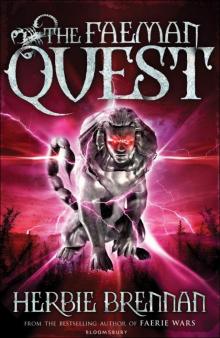 The Faeman Quest fw-5
The Faeman Quest fw-5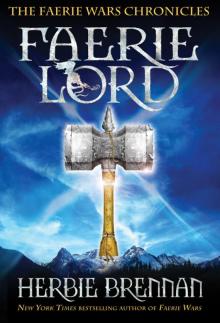 Faerie Lord
Faerie Lord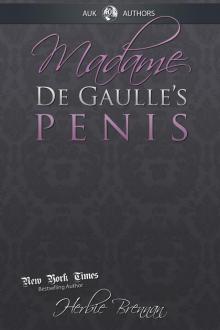 Madame de Gaulle's Penis
Madame de Gaulle's Penis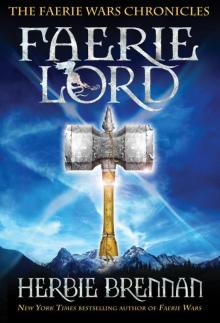 Faerie Lord fw-4
Faerie Lord fw-4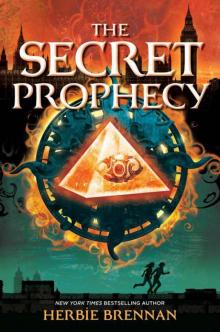 The Secret Prophecy
The Secret Prophecy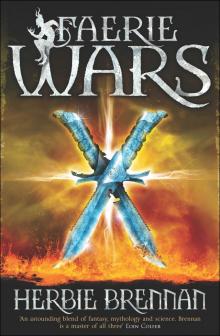 Faerie Wars
Faerie Wars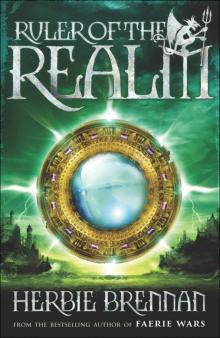 Ruler of the Realm
Ruler of the Realm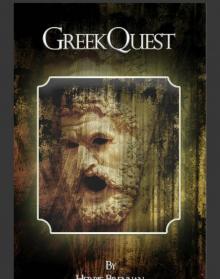 GreekQuest
GreekQuest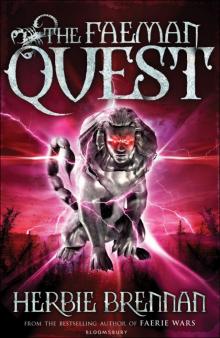 The Faeman Quest
The Faeman Quest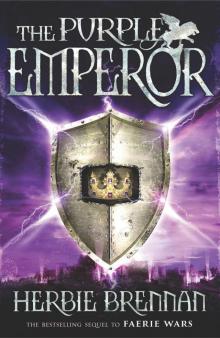 The Purple Emperor
The Purple Emperor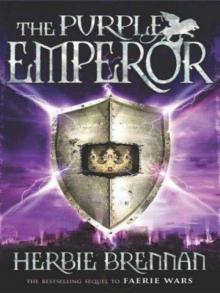 The Purple Emperor fw-2
The Purple Emperor fw-2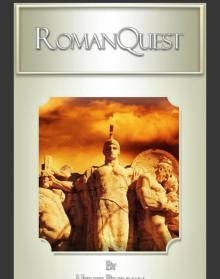 RomanQuest
RomanQuest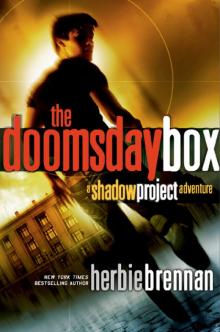 The Doomsday Box
The Doomsday Box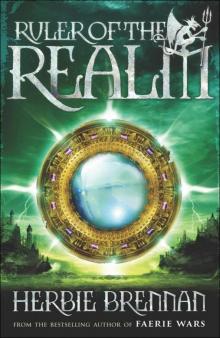 Ruler of the Realm fw-3
Ruler of the Realm fw-3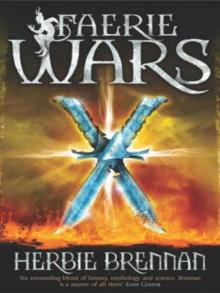 Faerie Wars fw-1
Faerie Wars fw-1